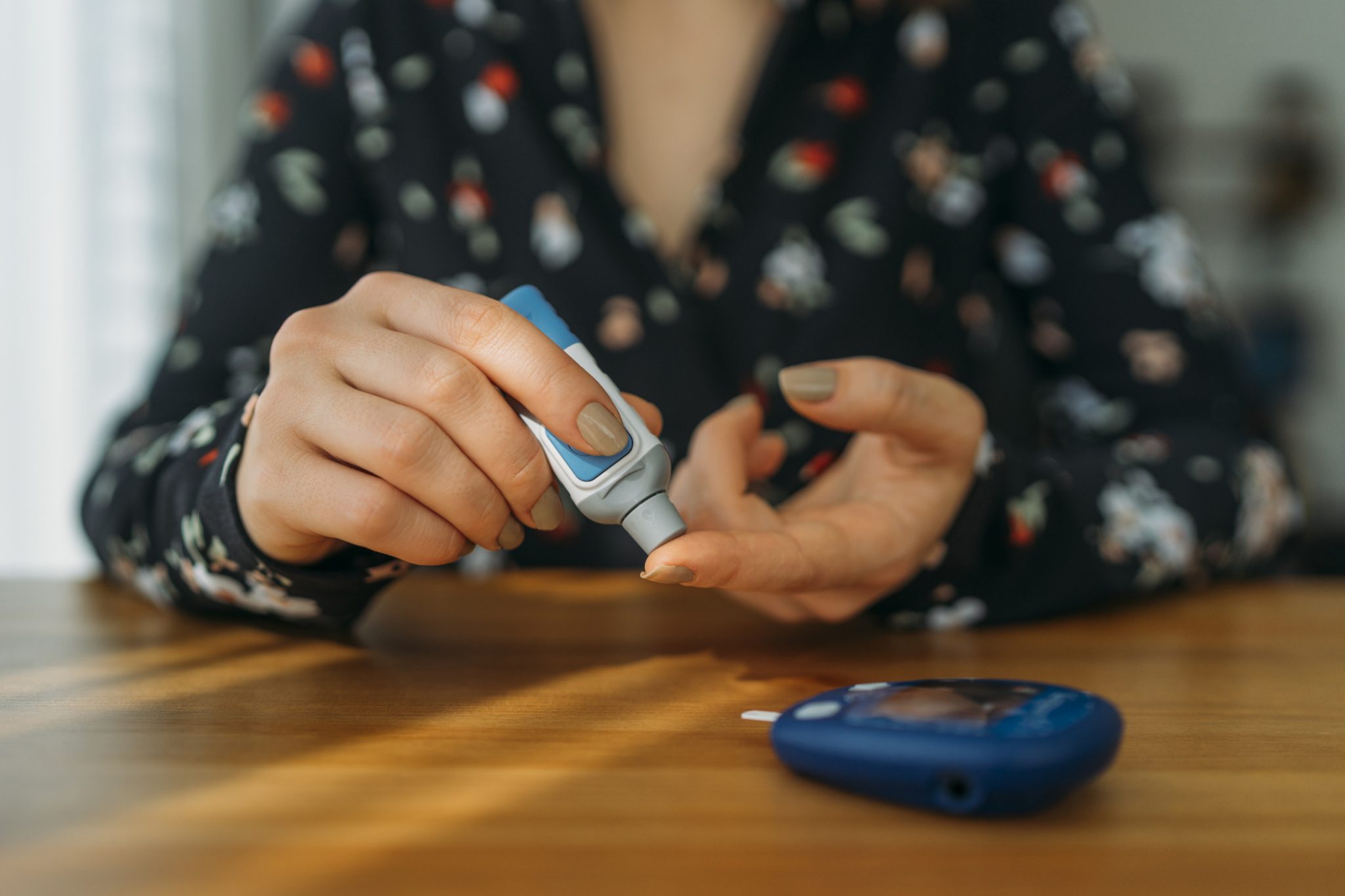5 Tips to Prevent Blood Sugar from Dropping at Night

October 10, 2019
By Brianna McCabe
Hypoglycemia, also known as low blood sugar or low blood glucose, occurs when blood glucose levels drop below normal—which is typically below a level of 70 milligrams per deciliter (mg/dL). With levels more commonly ‘dipping’ at nighttime, otherwise referred to as nighttime hypoglycemia, this condition affects mostly patients with diabetes.
What are some tips to prevent nighttime blood sugar level dips?
- Check your level before bed. According to Sulay Shah, M.D., a board certified endocrinologist, the only way to know if you are at risk is to monitor your blood glucose levels—as there aren’t always telltale signs.“If you check and you notice that your levels are close to 70 mg/dL at bedtime, then you know you might be at risk,” Dr. Shah says. In this case, he recommends eating some complex carbohydrates, like a peanut butter sandwich, an apple with peanut butter or one slice of multigrain toast with some avocado.
- Don’t skip dinner. If you aren’t eating dinner, Dr. Shah advises skipping your rapid-acting insulin or medicine, like glipizide or glimepiride, that can decrease your blood sugar levels. “The goal here is to match your meal and medication,” he says.
- Potentially adjust your exercise routine. Though you can exercise at any time of the day, Dr. Shah warns that aerobic exercises, like swimming or running on a treadmill, can cause your blood sugar to dip, whereas anaerobic exercises, such as weight lifting, can cause your blood sugar to increase. Therefore, Dr. Shah encourages individuals to start with anaerobic exercises and then transition to aerobic exercises.“Before you work out, check your blood glucose. If your blood sugar is below 80 mg/dL, eat at least 10 to 15 grams of carbohydrates—such as ¾ of an apple—before the workout and another 10 to 15 grams after,” says Dr. Shah.He continues, “As always, you must modify your insulin accordingly.” As explained by Dr. Shah, roughly 5 to 6 hours after you exercise the body becomes more insulin sensitive and muscles will utilize blood sugar to counteract the stress of the exercise.
- Monitor your alcohol intake. If you notice that your blood sugar is dropping after having a few beers or vodka sodas, then Dr. Shah warns that you may need to try to eat complex carbohydrates with the alcohol. Dr. Shah notes that blood sugar tends to drop 3 to 4 hours after drinking alcohol. “When you regularly drink alcohol, you are decreasing the amount of stored glucose in the liver which helps to maintain a blood sugar in normal range,” he explains.
- Understand your risk factors. Certain patient populations, such as older adults and those with diseases of the kidney or liver, need to make sure that their blood sugars are not too tightly controlled. “Talk with with your physician so they can modify your glycemic target to keep you in safe range,” Dr. Shah says.
How do you treat hypoglycemia?
Treatment for hypoglycemia involves both the immediate steps needed to raise your blood sugar level in addition with the later treatment or medication dose adjustment to prevent recurrence.
To immediately raise your blood sugar level, Dr. Shah advocates the rule of 15—eating 15 grams of carbohydrates and then checking your blood sugar level 15 minutes later. Fast-acting carbohydrates include:
- 4 glucose tablets
- 4 ounces of fruit juices
“Keep repeating these steps every 15 minutes until your blood sugar reaches above 70 mg/dL,” he explains. Once your level has stabilized, it’s important to then eat a snack or even a full meal to maintain that balance, Dr. Shah adds.
“If your symptoms are more severe and/or a person is unable to swallow, you may need an injection of glucagon,” he says.
To prevent episodes of hypoglycemia in the future, Dr. Shah says that treatment may involve the changing of prescribed regimens and dosages or adjusting your meal plans.
Why is it important to treat hypoglycemia?
If hypoglycemic episodes are frequent and left unaddressed , Dr. Shah explains that patients can put themselves at risk for several medical problems including:
- Cognitive impairment
- Dizziness or weakness
- Cardiovascular disease
- Poor glucose control
What are the signs of hypoglycemia?
An individual may frequently wake up in the middle of the night as a result of nighttime hypoglycemia. In other instances, though, people may know if they experienced hypoglycemia during their sleep if they notice the following symptoms:
- Waking up with a headache
- Waking up in a sweat
- Getting unusual feelings of tiredness throughout the day
- Experiencing anxiety or heart palpitations
- Feeling confused, dizzy or weak
Who else can be affected by hypoglycemia besides the diabetic population?
According to Dr. Shah, diabetics are more at risk of being diagnosed with hypoglycemia. However, the expert notes that there are non-diabetics who may be at risk of developing hypoglycemia, including those with carbohydrate sensitivities or those who had undergone gastric bypass surgery.
Are there any newer technologies to prevent hypoglycemia?
“We are lucky that in this day and age, we can predict hypoglycemia and prevent it through technology like continuous glucose monitors,” explains Dr. Shah. Additionally, he notes that there are newer insulins available to help decrease episodes of hypoglycemia.
“One of our roles as your doctor is to educate every patient about the self-management of diabetes and to create a personalized care plan,” explains Dr. Shah. “By self-managing your condition you will really feel empowered enough to take control of your health.”
Next Steps & Resources:
- Meet our source: Sulay Shah, M.D.
- To make an appointment with Dr. Shah or a physician near you, call 800-822-8905 or visit our website.
Resources
The material provided through HealthU is intended to be used as general information only and should not replace the advice of your physician. Always consult your physician for individual care.






